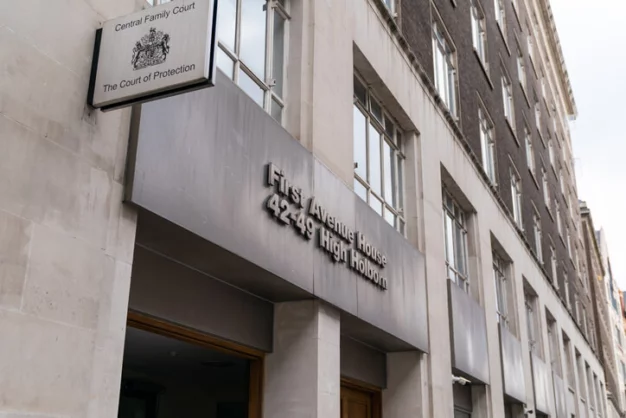Why Did Lauryn Goodman Take Kyle Walker to Court?

Contact
Table of Contents
Introduction to the case
After a judge took the unusual step of making his judgement public, we’re starting to hear more about Kyle Walker’s recent court battle with his former partner, Lauryn Goodman.
The high-profile Premier League footballer, who is married with four children, has two children with Goodman. The two-day Financial Remedy proceedings related to their youngest child, daughter Kinara.
Walker and Goodman never married. When their daughter was born, Goodman made an application under Schedule 1 of the Children Act 1989 for financial provision on behalf of Kinara. The claim involved a number of extraordinary demands on the sportsman, including a £2.4 million home, £33,000 air conditioning unit and an astro turf football pitch costing £31,000.
Ruling in favour of Walker, Judge Edward Hess called Goodman out for “spending money as if it was going out of fashion” and treating the footballer as an “open-ended cheque book.” While this ruling may seem like a victory for common sense, it raises some important issues regarding child maintenance and the responsibilities of unmarried parents.
It’s also quite rare for a judgement like this to be publicly reported upon. Family law proceedings are typically kept confidential, and the court’s push for transparency may influence how high-profile and high-net-worth divorce cases are reported in the future.
Claim to ensure child’s needs are met
The purpose of Schedule One of the Children Act 1989 is to ensure that a child’s needs are met and they don’t end up with a lower standard of living, just because their parents have split up.
It provides an avenue for a parent to seek financial provision from the other parent, and is most commonly used when the parents are unmarried.
The Court can make a number of orders to ensure that a child’s needs are met, including:
- Periodical Payments Order – Regular payments for child maintenance.
- Lump Sum Order – One-time payments for specific, child-related expenses such as school fees.
- Property Adjustment Order – Transfer of ownership in the family home to the resident parent so the child has a roof over their head.
Unlike financial settlements in a divorce, Schedule One claims can only relate to the needs of the children. There is no order for spousal maintenance, and the needs of the parent with care are not considered. However, the parent claiming relief can apply for the Household Expenditure Child Support Award (HECSA). These are household expenses connected to the role of carer that the resident parent cannot meet from their own resources. Often, they extend beyond direct expenses for the children.
You would expect to see transport, utility bills, clothing, leisure and holidays forming part of this provision, for example. This can sometimes blur the lines between HECSA and a spousal maintenance claim.
Why did Goodman take Walker to court?
Goodman, who describes herself as an influencer, has no formal paid employment, a minority share in her mother’s house, and significant debts.
Walker sits at the other end of the wealth spectrum. His net worth is estimated at £26.7 million, and his income is around £3.5 million – £5 million net per year.
The couple have already been in proceedings regarding their oldest child, Kairo. As a result of those proceedings, Goodman received (among other things) a £1.85 million property within a 60-mile radius of Sussex on condition that the property would revert back to Walker when Kairo finished his tertiary education, or when Goodman remarried or began living with another partner, whichever came first.
What did Kyle Walker do?
Walker voluntarily increased this housing fund to £2.4 million. Goodman agreed that if she wanted to move outside the 60-mile radius, the housing fund would reduce to £1.35 million, rising in line with inflation.
Kinara was born in June 2023, shortly after the conclusion of the proceedings regarding Kairo. Goodman immediately sought extra financial support for Kinara which included adjustments to the arrangements put in place for Kairo.
Among the claims, Goodman asked that the £1.35 million housing cap and the cohabitation trigger be removed. She also requested a £33,000 air conditioning unit, hot tub maintenance at £500 per month, a new Mercedes GLE every three years, totalling £70,000, £350,000 per year on childcare and £120,000 to spend on wardrobes, sofas, soft furnishings and garden furniture for her home.
Walker opposed some of these demands entirely or asked that the figures be decreased.
What did the Judge say?
The Judge found Walker to have taken a fair and generous stance—he had, after all, paid more than provided under the previous order for Kairo. Ultimately, the Judge found it in Walker’s favour. Goodman will receive some of the expenses she asked for, but typically at a far lower level.
Other expenses were denied altogether. HECSA is intended to cover care-related expenses for the benefit of the child, not to support the lifestyle of the primary carer. Therefore, expenses for a car were included but astroturf and air conditioning were not.
The judgement speaks for itself in laying bare Goodman’s pursuit of money. In the Judge’s view, Goodman should have accepted Walker’s offer months ago, eliminating the need for court proceedings and stress to all involved.
Takeaways from Walker-Goodman Court decision
When claiming Schedule One, it’s important to take a reasonable approach from the outset. Requests for expenses must be for the legitimate benefit of the child, and not presented as a wish list of luxuries for the primary carer.
The judge also took the unusual step of waiving anonymity in this case. He did so on the basis that trying to prevent the parties from being recognised when their children’s names had already been widely publicised—largely due to Goodman’s own actions—would have opened the court to ridicule.
Press were allowed to attend the hearing under the court’s new “transparency” pilot. Going forward, it’s likely that the press and the public will be afforded greater rights to see what happens in the family court and have fewer restrictions on what they can report. Those rights might outweigh a high-profile person’s desire for privacy.
For couples in this situation, it’s more important than ever to deal with financial settlements amicably. Exhausting all non-court options such as mediation before issuing a court application may be the best way of keeping your personal business away from the public eye.
Sarah Norman-Scott comments:
‘The key takeaways for me are
- If you want your private business to remain private, then consider all other avenues rather than litigation (especially because the sheer volume of press coverage must be difficult reading for Walker’s wife, Annie Kilner.
- If you are the one seeking the financial provision, take a reasonable stance because seeming greedy could be ‘an own goal’ and
- The amount of financial provision is directly linked to the payer’s affordability – so this outcome is purely as a result of Walker’s significant wealth but it is still a small proportion of his overall wealth’.
How we can help
We understand that the process of separating your financial lives may not always go as you expect. Seeking legal advice from an experienced divorce lawyer can help you understand your rights, protect your assets and achieve a fair settlement. To speak with our team, please:
- Call 020 7485 8811, or
- Complete the form below.
Share this article
Contact us today
Call us 020 7485 8811
Email us Send us an email and we’ll get back to you
Divorce insights and case studiesVIEW ALL
- 4.7.2025
Standish Ruling: What Counts as Matrimonial Property
Supreme Court confirms only a valuable asset treated by parties as a matrimonial asset has been ‘matrimonialised’ The financial remedies...
Read more - 11.6.2025
Property Value Drop Won’t Change Financial Order
Drop in matrimonial home value is not enough to overturn a financial order, says Court The financial remedies team at...
Read more - 1.5.2025
Foreign Courts: Putting Non-UK Assets Out of Reach
Financial Remedies: could a party use a foreign court to put non-UK assets out of reach? The financial remedies team...
Read more - 11.4.2025
Evidencing Company Valuations in Divorce Cases
The importance of evidencing calculations of company values The financial remedies team at Osbornes Law represents clients where significant investment...
Read more - 1.4.2025
Company Valuations & Deferred Consideration
Company Valuations And The Status of Deferred Consideration Following from my previous blog I wanted to discuss the very important...
Read more - 17.3.2025
Selling a House in Divorce
A guide to amicably selling a house during divorce One of the biggest issues in divorce is what happens to...
Read more - 24.2.2025
How Are Finances Divided On Divorce?
Avoiding Misconceptions: How Are Finances Divided On Divorce? The financial remedies team at Osbornes Law advises divorcing clients across London...
Read more - 21.2.2025
Protecting Business Privacy in Divorce Financial Proceedings
Business owners: protecting privacy of confidential information in financial proceedings on divorce We represent many business-owners in financial proceedings on...
Read more - 27.1.2025
Financial Remedies: Company Valuation in Divorce Cases
Financial Remedies: The Company Valuation Challenge The tricky matter of business valuations often arises in the course of financial proceedings...
Read more - 4.11.2024
Anglo-French Divorce: Jurisdiction Guide
Anglo-French Divorce: which jurisdiction is right for you? It has been a year since we launched our Anglo-French department in...
Read more - 29.10.2024
Economic Disadvantage in Divorce: Can You Be Compensated?
Giving Up High Earnings: Can A Party Be Compensated For Economic Disadvantage? In financial remedies cases, the fact that one...
Read more - 24.10.2024
Can a Declaration of Trust Stand in Matrimonial...
Matrimonial Homes: Can A Declaration Of Trust Of Beneficial Ownership Stand? Resolving issues relating to ownership of the former matrimonial...
Read more - 23.10.2024
When Abusive Behaviour Affects Divorce Financial Relief
When is Abusive Behaviour Relevant To Financial Relief on Divorce? Domestic violence and other abusive behaviours are a contributing factor...
Read more - 25.9.2024
What Happens to Savings & Investments in Divorce?
Divorce often raises important questions about the division of assets, particularly savings and investments. Understanding what happens to these financial...
Read more - 23.9.2024
International footballer fails to comply with financial disclosure
UD v TQ: The importance of complying with financial disclosure Recent divorce case involving an unnamed international footballer is a...
Read more - 20.9.2024
Pension Attachment Order: A guide
Pensions are quite often valuable assets in a marriage. In some cases, they can be worth more than the family...
Read more - 11.9.2024
Financial relief after overseas divorce: a case study...
Can I claim financial relief after an overseas divorce? Obtaining a divorce in Algeria did not prevent a wife from...
Read more - 27.8.2024
Pension Sharing Orders
Pension Sharing in Divorce With so many things to consider when dividing up your finances during a divorce or dissolution...
Read more - 20.8.2024
What is pension offsetting?
In this article, we will explore the concept of pension offsetting and how it can play a crucial role in...
Read more - 12.8.2024
NA v LA [2024] EWFC 113: Judge Orders Non-Court Dispute...
Financial Claims: Judges Can Order Parties To Attempt Non-Court Dispute Resolution As was expected, the court has been quick to...
Read more - 1.8.2024
Standish v Standish: Court of Appeal Decision on...
Court of Appeal reduces wife’s divorce award by £20million Dealing with financial matters on divorce can be complex. And...
Read more - 1.8.2024
Matrimonial vs Non-Matrimonial Assets
Matrimonial vs Non-Matrimonial Assets in Divorce During a divorce, people often make the mistake of assuming that everything they own...
Read more - 1.8.2024
What is a Periodical Payments Order?
Periodical Payments Orders in Divorce Throughout the process of a divorce or when unmarried couples with children split up, numerous...
Read more - 1.8.2024
What is a Lump Sum Order?
A lump sum order is a crucial element of divorce settlements that can significantly impact the financial future of both...
Read more
“Sarah, you have shown brilliant understanding of the requirements and have provided amazing counsel throughout. Your dedication to seeing this through right up to the last minute (before going on maternity leave) is a testament to your professionalism. I can’t thank you enough for your support and advice through some trying times”.
“Osbornes has been very kind and your advice has been great”.
“Just wanted to say thank you so much for being the voice of reason and for everything you have done for me. It is such a difficult time and I felt completely supported in the process today because of your presence”
“The client was singing your praises today as the best solicitor she has come across!”
“The flowers were to say ‘thank you’ for going beyond the call of duty to contact the other side. Most impressed by your ‘can do’ attitude, despite your work load today” and subsequently “thank you very much for all your effort and I am delighted I chose to trust you. I cannot thank you enough for your support. Thank you”.
“Thank you. I wouldn’t have made it this far without your help”.
“Thank you for your availability, courtesy and helpfulness during our divorce. I don’t know how many thanks you get from counterparties. It wasn’t all straightforward, and divorce is never a joyful time, but your clarity and helpful attitude made it much easier than it might have been”.

































